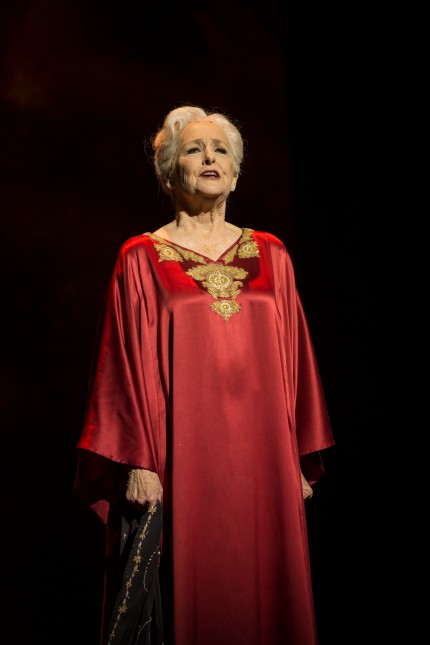A radiant von Stade can’t raise COT’s “Coffin in Egypt”

There is a contemporary subgenre of opera that lately has been making the rounds. Call it the “veteran diva vehicle” or the “my friend Flicka” show.
That’s when a composer who is a friend (and, of course, a fan) of a female opera singer of a certain age decides to write a work for his singer-friend as a starring vehicle. Most prominent among these are two of recent vintage, both created for the beloved Frederica von Stade: Jake Heggie’s Three Decembers, staged at Chicago Opera Theater in 2010, and Ricky Ian Gordon’s A Coffin in Egypt, which opened at COT Saturday night at the Harris Theater.
The Egypt of the title is a small town in Texas, where Myrtle Bledsoe, an aged, wealthy dowager has returned to her husband’s estate. After years of travel with her two daughters, she reflects on the conflicts of the past–mainly fights with her deceased philandering husband Hunter–and tries to come to terms with her past and find inner peace with a badly damaged life and family, to some extent of her own making.
Like many works mounted by COT in the Andreas Mitisek era, A Coffin in Egypt–adapted from a play by Horton Foote–is more of a theater piece than an opera, designed as a one-woman star turn for von Stade. Amid flashbacks and conversations with Hunter and her family, there are fitful vocal interludes –“aria” would be much too ambitious for the unchallenging music. But A Coffin in Egypt is largely an unbroken 80-minute monologue by Myrtle, interspersed by a hymn-singing gospel quartet to provide variety and reflect some of the troubled racial past of the Texas town.
There are many issues with Coffin, not least its central protagonist. Even when a victim, Myrtle emerges as a rather self-absorbed narcissist. Were she born in a different era, one can imagine her happily and obliviously posting selfies and self-portraits on Facebook.
Gordon’s music is effective enough on its slender terms, artfully scored for nonet, and cast in wistful, nostalgic mode, a couple of angry breakouts for Myrtle against the odious Hunter apart. There is also a somewhat forced attempt in Leonard Foglia’s libretto at casting a broader social net, with Myrtle’s patronizing comments on “negroes” and “colored people” representing, what the program note rather broadly refers to as, “the bigoted rich of Texas.”
While A Coffin in Egypt may fulfill its mission of creating a dramatic vehicle with obbligato music for the veteran star, taken on its own merits, this show is decidedly thin soup. Even with Hunter’s tawdry behavior and the crypto-racist edge of the selfish Myrtle, the static work never rises above a soft sentimentality and pervasive lightness of being. Ultimately, A Coffin in Egypt feels like opera theater for the Lifetime Channel set. Musically and dramatically, it’s a much less inspired effort then Gordon’s Orpheus and Eurydice, which was memorably staged by Mitisek in a park district swimming pool in 2013.
The main asset this COT production has going for it is, of course, its star. Von Stade, who will turn 70 on June 1, remains a radiant presence of extraordinary charisma, as well as one of the finest singing actresses of the past half-century. She brought a credibility, vulnerability and emotional depth to the unlikable Myrtle that almost made up for the lack of greater substance in the work. Vocally, her slender mezzo-soprano sounded in strong repair, flexible and with surprisingly full tone.
But who could really tell? As in previous productions of A Coffin in Egypt, von Stade and all the actors were heavily amplified, a fact not mentioned in the program, which bestowed a bright, unvaried theatrical loudness equally on the dialogue and the star’s singing.
In the small supporting cast of speaking roles, David Matranga effectively reprised his role of Hunter, with Carolyn Johnson, Whitney Rappano and William Dwyer rounding out the cast.
Librettist Foglia doubled effectively as stage director, efficiently moving the actors about. Riccardo Hernandez’s unit set offered tall, furled panels of evocative Texas wheat fields, which seemed like Zeffirelli’s La Boheme at the Met compared to COT’s usual bare-bones minimalism.
Apart from its luminous, timeless star, the fleeting bright spots were provided by the singers that made up the well-blended gospel quartet (Kimberly E. Jones, Leah Dexter, Bernard Holcomb and Nicholas Davis) and an impressive debut by conductor Emanuele Andrizzi, leading the nine-musician pit ensemble.
There was an enthusiastic standing ovation for the popular von Stade in what will likely be her final opera appearance in Chicago. At least until another friend writes another farewell piece for her.
A Coffin in Egypt runs through May 3. chicagooperatheater.org.
Posted in Performances



Posted Apr 27, 2015 at 6:27 pm by Roland Buck
This is the kind of trivia that Mitisek is now saddling the audience of COT with in place of the previous director’s policy of presenting a baroque opera each year. Under the previous director, instead of this kind of fluff, the COT could have heard a great baroque masterpiece, like, for example, Handel’s Semele, or Monteverdi’s The Coronation of Poppea with a prima donna in her prime who would not have needed any amplification.